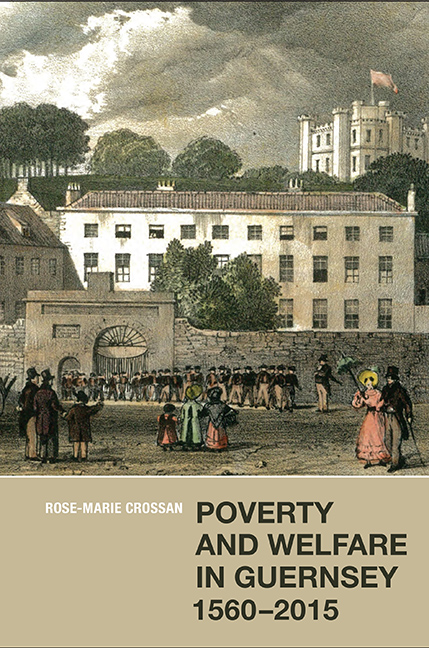Book contents
- Frontmatter
- Dedication
- Contents
- List of Illustrations
- Acknowledgements
- Abbreviations
- Conventions, Note on curren
- Maps
- Introduction
- I Context
- II Welfare
- III Town Hospital
- IV Twentieth Century and Beyond
- Conclusion
- Appendix 1 Writings on Peasant Proprietorship in Guernsey
- Appendix 2 Poor Rates, Indoor and Outdoor Relief Spending, St Peter Port, 1724–1924
- Appendix 3 Parochial Poor Relief in Other Channel Islands
- Appendix 4 Average Year-end Head-counts and Average Annual Admissions and Discharges, Town Hospital, 1700s–1900s
- Appendix 5 Adult Admissions Ascribed to Illness and Accidents, Town Hospital, 1852–1919
- Appendix 6 Relative Proportions of Men and Women in Year-end Head-counts and Annual Admissions, Town Hospital, 1750–1919
- Appendix 7 Annual Averages of Child Admissions and Year-end Numbers, Town Hospital, 1756–1919
- Appendix 8 Over-60s as a Proportion of all Inmates, and Composition by Sex of Over-60s Cohort, Town Hospital, 1756–1911
- Appendix 9 Average Weekly Amounts Purchased per Head, Town Hospital, 1760–1917
- Appendix 10 Timeline: Developments in Poor Relief and Social Security, 1700–2010
- Bibliography
- Index
7 - Infirmary and Lunatic Asylum
Published online by Cambridge University Press: 18 June 2021
- Frontmatter
- Dedication
- Contents
- List of Illustrations
- Acknowledgements
- Abbreviations
- Conventions, Note on curren
- Maps
- Introduction
- I Context
- II Welfare
- III Town Hospital
- IV Twentieth Century and Beyond
- Conclusion
- Appendix 1 Writings on Peasant Proprietorship in Guernsey
- Appendix 2 Poor Rates, Indoor and Outdoor Relief Spending, St Peter Port, 1724–1924
- Appendix 3 Parochial Poor Relief in Other Channel Islands
- Appendix 4 Average Year-end Head-counts and Average Annual Admissions and Discharges, Town Hospital, 1700s–1900s
- Appendix 5 Adult Admissions Ascribed to Illness and Accidents, Town Hospital, 1852–1919
- Appendix 6 Relative Proportions of Men and Women in Year-end Head-counts and Annual Admissions, Town Hospital, 1750–1919
- Appendix 7 Annual Averages of Child Admissions and Year-end Numbers, Town Hospital, 1756–1919
- Appendix 8 Over-60s as a Proportion of all Inmates, and Composition by Sex of Over-60s Cohort, Town Hospital, 1756–1911
- Appendix 9 Average Weekly Amounts Purchased per Head, Town Hospital, 1760–1917
- Appendix 10 Timeline: Developments in Poor Relief and Social Security, 1700–2010
- Bibliography
- Index
Summary
Infirmary
Doctors
From the Town Hospital's earliest days, there were always some among its inmates who were sick or infirm. Certain areas within the institution were set aside for them, and they were tended by other inmates, usually women, deployed as ‘nurses’. At first, the Hospital did not employ a doctor of its own, but called in practitioners as the need arose. Among these were Jean La Serre, a Huguenot refugee from the Languedoc, and his Guernsey-born son William. In 1752, the Hospital decided to cease paying for doctors’ visits ad hoc and instead to pay William La Serre an annual stipend of £10 (sterling) in return for his regular attendance. La Serre then combined periodic calls at the Hospital with his external private practice. On La Serre's death in 1774, the Hospital's Treasurer, Matthew De Saumarez, himself a former naval surgeon, took over the Hospital work, and he was succeeded four years later by his son John.
By 1805, John De Saumarez was receiving an annual stipend of £30 from the Hospital. After the anti-Condamine ‘coup’ of 1809, De Saumarez resigned along with Treasurer Jean Condamine. He was replaced as Hospital surgeon by his nephew, John Carey, who also happened to be one of the new Directors. Carey held the post until 1820, when he was replaced by his cousin William Brock, who served as Hospital surgeon for only a year. Both Brock and Carey, and perhaps De Saumarez, seem also to have been responsible for St Peter Port's outdoor poor.
William Brock's departure in 1821 heralded the introduction of a new poor law medical system in St Peter Port. The end of the Napoleonic Wars had left many ex-naval and military surgeons in Guernsey, and they had complained at the concentration of poor law work in the hands of a single individual with undefined tenure. As we saw in Chapter 4, the parish responded to their complaint by instituting two separate medical officers, one for the Hospital and one for the outdoor poor, each with annual tenure. The Hospital doctor was to be appointed by the Board of Directors at the start of each year, and only practitioners who paid rates in St Peter Port were eligible to apply. The post remained non-residential and part-time, with doctors free to continue in private practice.
- Type
- Chapter
- Information
- Poverty and Welfare in Guernsey, 1560-2015 , pp. 145 - 176Publisher: Boydell & BrewerPrint publication year: 2015



